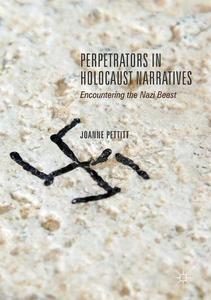Dr Joanne Pettitt was awarded her PhD by the University of Kent in 2016 and is now a Lecturer in the Department of Comparative Literature. Her research interests lie at the intersection of Holocaust studies, memory studies and perpetrator studies; her book, Perpetrators in Holocaust Narratives: Encountering the Nazi Beast (Palgrave Macmillan, 2017), examines representations of Holocaust perpetrators in literature, exploring fictional accounts of Holocaust perpetration as well as Nazi memoirs.
Joanne’s interest in Holocaust perpetrators stems from a fascination with human behaviour: for the most part, the Nazis did not do what they did thinking they were doing something wrong, but how did they get to a point where they felt that what they were doing was morally justified, if not morally commendable? Asking this question provides fascinating insights into the human condition, revealing our capacity for cruelty and our deeply entrenched desire to fit in.
Literary accounts respond to these issues, helping to shape our understanding of perpetrator figures as they do so. The main goal of texts of this kind is to undo the myth of pure evil that surrounds the Holocaust and to reconstruct the perpetrator in more “human” terms. A significant consequence of this is the impact it has on the reader, who is drawn into the narrative as a potential perpetrator who could, in similar circumstances, have acted in similar ways. The tensions that this creates, especially in relation to the construction of empathy, constitutes a major focus of Joanne’s research.
As fascinating as all of this is, studying representations of perpetrators of the Holocaust is not without its controversies. Indeed, foregrounding the figure of the perpetrator creates an ethical quandary: on the one hand, there is a strong desire and need to understand the motivations behind actions which have affected many millions. On the other, many feel that it is important not to try to understand, because understanding might in some way imply ‘forgiveness’. Attempting to navigate this impasse, literary accounts tend to both reveal the ordinariness of the perpetrator and mask it behind deviances and (other) criminal activities, as if the Holocaust is somehow not “guilty enough” to warrant straightforward condemnation. Certainly, it seems that authors are still reluctant to show Nazis as too ordinary, too much like us. Yet in the context of the current rise of the far-right, it is more important than ever to remember where such politics of exclusion can take us, and to challenge our susceptibility to hatred and violence.
Joanne’s work has been described by Professor Sue Vice at the University of Sheffield as “…an excellent and highly original contribution to the newly established field of perpetrator studies, in which [Dr Joanne Pettitt] takes the innovative approach of tracing textual and ethical patterns in more than 60 primary sources. These range from fiction by such novelists as Edgar Hilsenrath, David Grossman and Jodi Picoult, to fictional versions of the figure of Adolf Hitler, and analyses of the memoirs of perpetrators themselves, including the autobiography of Rudolf Höss. By this means, Dr Pettitt carefully draws out significant elements of these texts’ designs on the reader and the narrative strategies they must adopt in order to represent such a problematic topic.”


